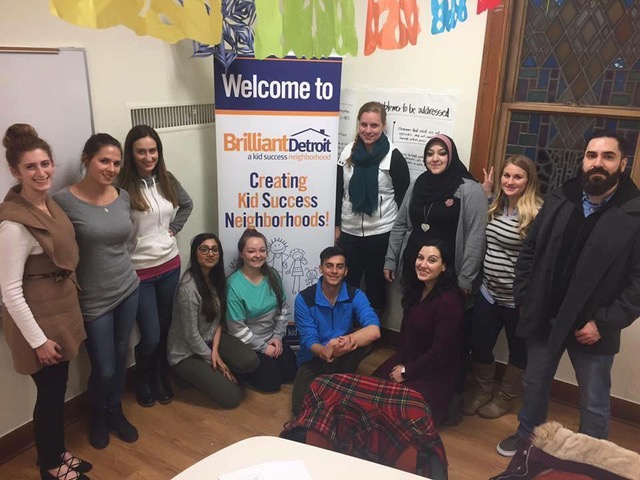Students facilitate mental health workshops to beat back pandemic stress
No U.S. city has been crushed by pandemic stress quite like Detroit. COVID-19 continues to wreak havoc on families, and an organization with a front row seat to some of the city's hardest hit neighborhoods is Brilliant Detroit. Dedicated to creating "kid-success communities," Brilliant Detroit transforms underutilized housing stock into community centers, called "houses," where families can come together for fellowship, learning activities, and support. Due to coronavirus, these centers shut their doors and Brilliant Detroit has been forced to reinvent how they connect with families.
The organization enlisted the help of the Family Resilience Lab run by Erika Bocknek, Ph.D., LMFT, in the Wayne State University College of Education. The two have a long-standing partnership called the Detroit Family Resilience Project. Together, they investigate and work to meet the mental health needs of those in Brilliant Detroit's eight neighborhoods, seek to understand barriers that prevent service utilization, and work with young families to better understand racial socialization in early childhood, according to the Family Resilience Lab website. So, when COVID-19 hit, the Family Resilience Lab sprung into action, developed and started to facilitate mental health workshops to mobilize resources Brilliant Detroit provided pre-pandemic.
Coping with COVID
The workshops launched in June and are ongoing. They take place over Zoom, are attended by lab members, Brilliant Detroit managers and parents affiliated with neighborhood centers. The sessions allow the managers and lab to hear directly from the community about their immediate needs and offer advice on self-care, coping techniques for the body and mind, and lessons in resilience-a common theme in the lab's research.
More: Photography program helps refugee and immigrant teens cope during the pandemic
"Resilience is like any other muscle in our body that can be strengthened," Brooke Wood said, a doctoral student in the counseling psychology program and member of the Family Resilience Lab. "It is something we work on daily which can be affected by our day to day stresses, interactions and connections with family."
To help families exercise this muscle and cope with pandemic stress, lab members share strategies for coping during COVID-19, such as focusing on routine, regularly asking "What am I thankful for?" staying present by practicing a five senses grounding activity, staying mindful of nutrition by practicing meal planning, and practicing self-care.
Most parents said finding time for self-care was their biggest struggle. So, the lab members tried to show that "self-care has many hats," Wood said. "Maybe it's journaling, taking a hot shower, taking a nap, enjoying a few chapters of a good book, or making a schedule for the next week. The point is, there is no perfect way to cope with a pandemic that turns your whole world around."
That's where resilience comes in.
"It was amazing to hear all of the ways these moms are coping with COVID, how well they have taken on these unexpected roles-like suddenly becoming their child's teacher--and how positive they remain despite any grief or loss they might be experiencing," Wood said.
At the end of each workshop, parents leave with a takeaway sheet that lists these coping strategies and links to helpful resources, such as the Black Mental Wellness website, Black Lives Matter Meditation and a guide on how to talk with children about grief.
Psychological trauma

On June 11, the Family Resilience Lab had a paper published in the journal Psychological Trauma, titled: "Collective Trauma and Community Support: Lessons From Detroit."
"We highlight the efforts of BD and how it can serve as a model for others looking to take a community-oriented approach to supporting those affected by the pandemic," said Addison Duane, a doctoral student and one of the authors of the paper.
Since the outbreak, Brilliant Detroit has been serving families by offering free Internet access, financial support, groceries, tutoring, medical information dissemination from university partners, teletherapy and, of course, mental health workshops, according to the publication.
The paper also examines how the complex risk factors associated with poverty, trauma exposure, and mental issues intersect and are exacerbated by the current crisis, as well as how the groundwork Brilliant Detroit laid in neighborhoods pre-COVID-19 helps mitigate the risk of these communities' collective trauma in the wake of the pandemic.
Duane explains that the continued closure of the lab on Wayne State University campus has put a halt on in-person data collection, but members continue to support the lab's community partners by offering remote services for Brilliant Detroit and these families.
Plans are in the works for future workshops on combating pandemic stress, and the lab anticipates others geared toward distance learning and how to support parents amidst school closures in the fall.
The Detroit Family Resilience Project team includes
Erika Bocknek, Ph.D., LMFT
Bocknek is the principal investigator of the Family Resilience Lab and assistant professor of educational psychology. Her research interests relate to the social-emotional development in young children in the context of parenting and family relationships. Her research emphasizes resilience promotion in populations at risk as the result of poverty and trauma exposure.
Christina DeAngelis, M.A.
DeAngelis is a doctoral student in the counseling psychology program and a licensed therapist. Her research interests relate to patterns of coping and the intersections of mental and physical health.
Brooke Wood
Wood is a doctoral student in the counseling psychology program. Her research interests relate to mental health in early childhood and parenting processes that support development.
Kimberly Stokes
Stokes is a doctoral student in the counseling psychology program and a former elementary school teacher. Her research interests relate to social-emotional development in childhood, trauma-informed interventions for schools, and culturally responsive mindfulness practices for African-American children.
Addison Duane
Duane is a doctoral student in the educational psychology program and former elementary school teacher from Northern California. Her research interests relate to trauma in schools, the trauma-informed schools movement, social-emotional learning, and critical race theory.
Written by Kristy Case